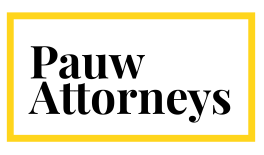Civil Litigation Law
A Strategic Guide to Selecting the Best Civil Lawyer in Port Elizabeth
|
Where possible, we advise and negotiate suitable settlement proposals on behalf of clients.
Facing a legal dispute is daunting. Whether you're dealing with a breach of contract, a property dispute, or another civil matter, the outcome often depends on the quality of your legal representation. Finding the right civil lawyer in Port Elizabeth is the most critical first step you can take.
At Pauw Attorneys, we believe an informed client is an empowered client. This guide is designed to help you navigate the selection process and choose a legal partner in Gqeberha (Port Elizabeth) who has the experience and dedication to effectively champion your case.
First, Understand What a Civil Litigation Attorney Does
Before you can choose the right one, it's important to know what a civil lawyer does. Unlike criminal law, civil law deals with disputes between individuals or organisations.
An experienced civil litigation attorney in Port Elizabeth can represent you in a wide range of matters, including:
- Contract Disputes: Enforcing agreements or seeking damages for a breach of contract.
- Property and Real Estate Disputes: Including eviction matters, boundary disputes, and issues with property sales.
- Debt Recovery: Assisting businesses or individuals in legally recovering outstanding funds.
- Delictual Claims: Seeking compensation for damages or losses caused by another party's wrongful actions (e.g., personal injury, defamation).
- Construction and Building Disputes.
- Interdicts and Urgent Applications.
Our team at Pauw Attorneys has extensive experience handling these matters in both the Port Elizabeth Magistrate's Court and the High Court.
5 Key Steps to Choosing Your Lawyer in Port Elizabeth
1. Verify Their Specialisation and Experience
The law is vast. A lawyer who excels at criminal defence may not be the best choice for a complex contract dispute. Look for an attorney in Port Elizabeth who specifically lists "Civil Litigation" as a core practice area.
- Ask directly, "What percentage of your practice is dedicated to civil litigation?"
- Look for case studies: Do they have a track record of success in cases similar to yours?
- Local Knowledge: An attorney familiar with the Gqeberha legal environment and local court procedures has a distinct advantage.
2. Assess Their Communication and Approachability
You will be working closely with your lawyer, often discussing sensitive information. You need someone you can trust and communicate with easily. During your initial consultation, consider:
- Do they explain complex legal terms in a way you can understand?
- Are they listening to your side of the story without judgement?
- Do they outline a clear, strategic path forward?
A good lawyer acts as both your advocate and your advisor.
3. Understand Their Fee Structure
Transparency regarding legal fees is a hallmark of a professional law firm. Before you commit, make sure you have a clear understanding of their fee structure.
- Ask for a written fee agreement.
- Understand if they charge an hourly rate or a fixed fee for certain services.
- Enquire about potential disbursements (additional costs like court fees, expert witness fees, etc.).
A reputable lawyer in Port Elizabeth will be upfront about the potential costs involved in your matter.
4. Check for Professional Standing and Reviews
Your chosen attorney must be in good standing with the Legal Practice Council (LPC) of South Africa. You can also look for independent reviews and testimonials online. While a single bad review may not be a deal-breaker, a pattern of negative feedback should be a red flag.
5. Trust Your Instincts at the Initial Consultation
The initial consultation is your opportunity to interview the attorney. This is a crucial step. It allows you to assess their professionalism and determine if you feel comfortable placing your trust in them. At Pauw Attorneys, we offer confidential consultations precisely for this reason, allowing you to make an informed decision without pressure.
Why Choose Pauw Attorneys as Your Civil Lawyer in Port Elizabeth?
Choosing Pauw Attorneys means choosing a dedicated and compassionate partner.
- Local Expertise: We are based in Port Elizabeth and have a deep, practical understanding of the local legal landscape.
- Client-Centred Strategy: We don't believe in a one-size-fits-all approach. We listen to your unique situation and develop a legal strategy tailored to achieve your specific goals.
- Clear Communication and compassion for our clients: We cut through the legal jargon and ensure you are kept informed at every stage of your case.
Take the Next Step: Schedule a Consultation Today
Don't leave the outcome of your civil dispute to chance. If you are looking for an experienced and trusted attorney in Port Elizabeth, contact Pauw Attorneys today to schedule your confidential consultation. Let us help you understand your rights and options, and provide the expert legal representation you deserve.
What is litigation?
Litigation is the process of taking a legal dispute to court.
Related Services:
Arbitration
Mediation
General litigation
Litigation is a complex area of law and involves the representation of clients in the various Courts of our South Africa including the High, Magistrates’, Appeal, Constitutional and Criminal Courts. Litigation involves the legal process for settling those disputes or claims between and amongst natural persons, juristic persons and the state that requires objective determination.
Pauw Attorneys represents clients in litigation, arbitration and mediation.
What is civil law?
The term “civil law” refers to a variety of legal fields. At its broadest, civil law refers to all areas of law except criminal law. But the main areas usually referred to as civil law are contractual matters, business disputes, company law, property disputes, and personal injury cases.
Civil litigation is ordinarily between two or more parties and is conducted in a public forum. This process is formal and highly regulated.
The court where the action or application is instituted must have jurisdiction over the matter to hear it. Jurisdiction is established when the cause of action arose in the area where the Defendant resides or is domiciled within the area of that court.
There is a hierarchy of courts in South Africa:
- The Constitutional Court,
- The Supreme Court of Appeal,
- The High Court,
- The Magistrates' Courts.
Is there an alternative to suing in court?
Yes, there is another way, known as Alternative Dispute Resolution. This refers to Arbitration, which is a way to resolve disputes outside the courts. The dispute is decided by one or more persons, called the arbitrators. The rules applied are generally more straightforward than those used in court. The award is legally binding on both sides and enforceable in court. Costs are usually less than in the courts.
Picking a Court
Courts may only reside on a matter if they have Jurisdiction over it; therefore, you do not get to choose the Court you wish your matter to be heard in.
Many factors influence a Courts Jurisdiction, such as the value of a claim, the nature of the claim and geographical area.
Courts have authority over specified geographical areas.
The Court will have Jurisdiction over a matter if the Defendant is an ordinary resident or domiciled in the geographical area over which the court has authority or if the claim arose within said area.
Proceedings usually begin with a letter of demand setting out the claimant's claim and providing a date by which the other party is to adhere to such claim.
If the other party does not comply with this demand, the claimant can start civil proceedings either by:
Bringing An Action
This procedure is used in matters involving a factual dispute. It involves both the Plaintiff and the Defendant making submissions to court, producing evidence (by exchanging relevant documents and involving witnesses giving oral evidence) and culminates in a trial. The action is begun when a summons with particulars of claim has been issued out of the court and served on the Defendant.
Launching An Application
This procedure is generally quicker and can only be used where there is no factual dispute. All the documentary evidence on which a party wants to rely must be attached to the affidavits submitted to court. This process is started once the following documents have been issued out of the court and served on the Respondent:
- a notice of motion setting out the relief that the applicant seeks; and
- an accompanying witness statement in the form of an affidavit.
The Procedure in Court:
In an application procedure, the matter is heard in the Motion Court. The matter is argued on the papers before court, with special reference to the Heads of Argument and the evidence given therein. One may present oral evidence in Court, but this is generally not needed.
An action procedure ends in a trial. South Africa follows an adversarial trial system; this allows for the Plaintiff and Defendant to argue their versions of the matter in Court.
The procedure in Court generally goes as follows: Plaintiff’s legal representative will set out the Plaintiff’s case before the Court and will present enough evidence before the Court to prove, on a balance of probabilities, that the Plaintiff's case is reasonably and possibly true. Once this is done, the Plaintiff will close their case.
The onus to disprove the Plaintiff’s case, on a balance of probabilities, shifts to the Defendant. The Defendant will set out evidence before the Court which disproves the Plaintiff’s case. Once the Defendant is confident that they have disproved the Plaintiff’s case, they shall close their case.
If witnesses are called to give evidence in Court then the examination of the witness will proceed as follows:
- Examination-in-chief: done by the party who called the witness;
- Cross-examination: done by the opposing party;
- Re-examination: done if the party calling the witness deems it necessary to do so.
Once both the Plaintiff and Defendant have closed their cases, both parties shall present their closing arguments. No new evidence may be adduced in the closing arguments. Then the Judge shall deliver his/her judgement with reasons for the Judgement.
In conclusion, there are various factors to consider when taking the first step in the litigious process.
Please feel free to reach out to us for more assistance.


